Interview with David Rosenthal, Player, Programmer, and Industry Pundit
June, 2012
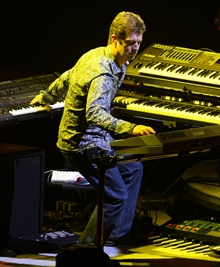 For people who aren't familiar with your background, could
you summarize how you got to be where you are today?
For people who aren't familiar with your background, could
you summarize how you got to be where you are today?
Well, I got my first synth at around 15, which was inspired by Tomita's Pictures at an Exhibition. At that point there was no doubt in my mind I needed to get into synthesis and working with synthesizers was what I wanted to do. I got a Roland SH1000 and started messing around with it, but it wasn't until I went to Berklee that I really got into synthesis and studied synths formally. I've always been fascinated by technology and what synthesizers could do. At that point there was no title like "Synth Programmer", it was just something keyboard players did in order to make their own sounds.
Then polyphonic synths came along, and then synths with memory so that they could retain patch data, and then MIDI was born, and shortly after that computers started being used for music. Then down the line virtual instruments were invented, and that eventually lead me to Receptor. But my roots go all the way back to patch cable synths, where I learned the basics of synthesis.
You do many different things, including playing keyboards for Billy Joel, orchestration and arranging for Broadway shows, and doing synth programming and system design for huge tours like Bruce Springsteen. What do you think is your greatest strength?
Its tough to say - I'd like to think my strength is whatever I'm working on today! (laughs) Most people tend to think of me as a keyboard player, and that's what I've been doing the longest, but I'm very comfortable doing orchestration, I enjoy it, and that's the same with programming. In recent years I've had opportunities to do programming where I wasn't the keyboard player, and I've enjoyed that almost as much as if I were playing the parts. It's all still music, and both roles have their own set of challenges.
What was your first big programming gig?
| |
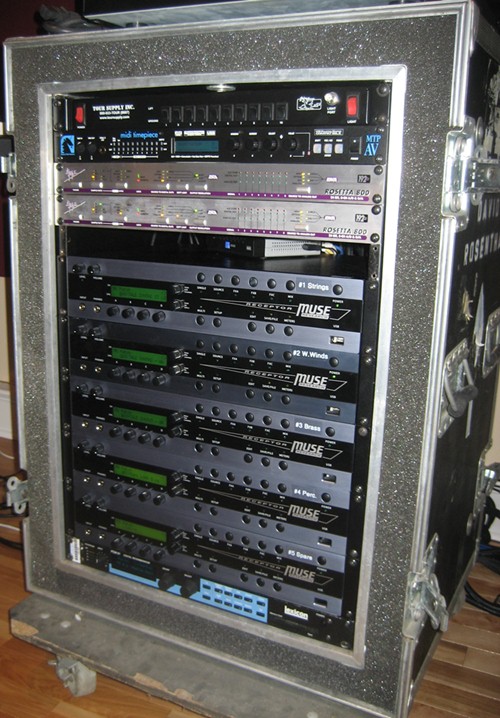
|
Receptors used in Tale of Two Cities.
|
| |
| |
Back in the 90�s I programmed synths for Dream Theater on their Change of Seasons album, but the first time I programmed for a live performance where I wouldn�t be the performer was for the Billy Joel / Twyla Tharp Broadway Musical Movin' Out. For that show I did the synth programming and also wrote the synth book, and was assistant MD on all 4 productions of it.
Later I got the opportunity to do a show called Tale of Two Cities where I did the programming, and wrote and arranged the synth books for the three keyboard players in that show. For that I made extensive use of RECEPTORs. "Tale" was great because I was also able to utilize my orchestration skills. I was given a score that was larger than the available instrumentation in the pit, so I had to create a reduction in which three keyboardists using RECEPTORs would be able to cover the required instrumentation. Later when the show went to Broadway, I modified it again for performance by two keyboardists with RECEPTORS since more traditional instrumentalists were available for the Broadway run.
You are unique in the sense that you are both an accomplished player and an accomplished programmer. How do you think your experience as both player and programmer affects your approach to programming up a show? What kind of special things to you take in to account based on your experience as a performer?
I think it's very important to make things as bulletproof as possible. I know what it's like to be the guy on stage playing and having to be 100% reliant on your gear. As a result, I know what goes through the head of a performer, and I know what they should or shouldn't be worrying about during a show. The art of programming is making it so that when your work is done, you can just play, and enjoy the performance. The player needs to know that its all just going to work, all the sounds are going to be there, and everything will be fine so that you don't have to worry about anything but the music. So having experience as a performer is a big help for me as a programmer when I'm getting a show together for someone else, since I know what needs to be there in advance. Being familiar with both worlds, with their different thought processes, is really beneficial to me.
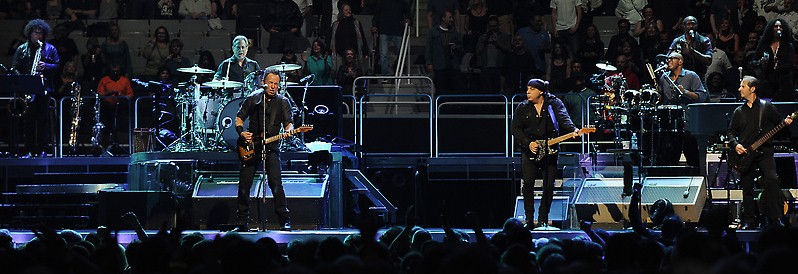
You've just finished getting a monster rig together for the new Bruce Springsteen Wrecking Ball tour that is currently making its way around the world. It doesn't get much bigger than that! How did you get involved in the Boss' camp, and what was your approach in designing the rig for this tour?
I originally got involved with Bruce on the "Rising" tour back in 2002/03. At that time I was helping them get sounds from their synths, doing some sampling, that kind of thing. For the new Wrecking Ball Tour, there were a lot of sounds used on the recording (many from virtual instruments) that needed to be played live. So I was brought in initially to get the sounds used on the album into the live rigs, and obviously RECEPTOR was the prime candidate for that. I simply took the plug-ins that were used on the album like Omnisphere and Kontakt and imported the exact sounds from the albums into the RECEPTORs for playing live.
Part two was to take some of the sounds that reside in their older equipment, like sounds from DX7s, Kurzweil K2600s, Korg M1s, as well as a bunch of Emulator IV samples, and incorporate them into the RECEPTORs to streamline the rigs. A lot of sounds coming from this old gear weren�t very efficient to use live. By redesigning and streamlining both keyboard rigs we were able to bring them into the modern era and make everything more efficient. So there was a fair amount of time spent porting over their old sounds such that they still sound the same, but are now facilitated on newer equipment.
Wow... that sounds like an incredible amount of work. You said "we were able to bring them in to the modern era"... whom else did you work with in getting the rigs ready, and what were their roles?
Bruce has 2 great keyboard techs � Marty Gelhaar and Bill St Amour (who take care of Roy Bittan and Charlie Giordano respectively). They�ve been there for several tours so they�re very familiar with all of the material and what sounds are used where. After watching some rehearsals and consulting with them extensively, I gained a solid understanding of the musical needs of both keyboardists and was able to design both systems to function optimally. Marty and Bill are good programmers too and their contributions were invaluable. We made a great team.
I know that the Springsteen organization has used RECEPTORs for several years now, but they have added quite a few new units and they serve in a dramatically increased role. How many units are there on the tour, and how are they being used?
In total, there are 10 RECEPTOR 2+ PRO units on tour, configured as five stations, with five units to serve as backups for each of the main units because this is a gig where nothing can ever fail for any reason. If you've ever seen Bruce live, it is a musical marathon that can sometimes last for hours, so everything has to work all the time, no excuses. More important, there are no intermissions or breaks to do any gear swaps, hence everything has a backup unit.
| |
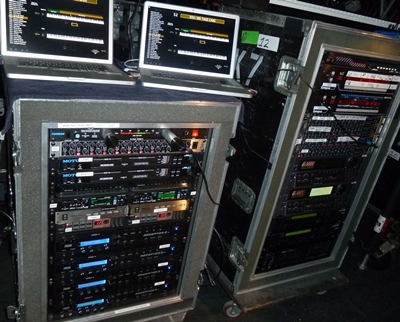
|
Roy Bittan's understage rig:
The rack on the left
is the new system with duplicates of everything as spares.
The rack on the right is the old system which is no longer in use
|
| |
In Roy Bittan's rig we have a dedicated RECEPTOR 2+ PRO for running Ivory II. That unit provides all the piano sounds for the entire show. Since he plays piano on so many songs throughout the show we decided to dedicate a Receptor just for running Ivory II, essentially making it a dedicated piano module and not running any other plug-ins on that particular unit. Of course, RECEPTOR is totally capable of running multiple plug-ins at once, but we just wanted to make that an independent instrument because it plays a continuous and important role.
Also in Roy's rig is a second RECEPTOR that is running maybe 6 or 7 instantiations of Kontakt 5 with all the sounds that were imported from the Emulators in addition to some other sounds imported from the older records. We also brought in some sounds from a TG-77 that were sampled into the computer using Autosampler, and then transferred the samples into the RECEPTOR for playing the sounds.
Autosampler is great for getting sounds off of older gear that you can't or don't want to take on tour - its great technology for streamlining a rig. It will automatically send MIDI messages to a synth, sample the audio output of the device note by note, and automatically create a Kontakt Instrument out of the results. After you're done, you just drop the bank into RECEPTOR, launch Kontakt, and away you go.
| |
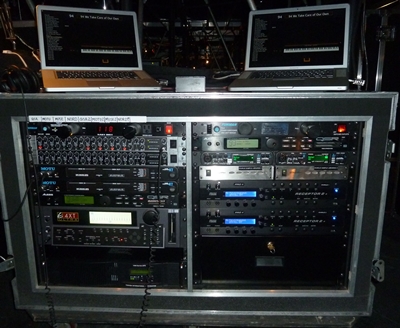
|
Charlie Giordano's understage rig:
The new system
with duplicates of everything as spares. The Alesis and EMU
modules are part of the old system and are no longer in use.
|
| |
In Charley Giordano's rig, there is a RECEPTOR running maybe 14 or 15 instantiations of Kontakt 5 with all the sounds from the older sound modules that they were using prior to this. That RECEPTOR is also running Omnisphere for presets that were used on the album. So that's the third station.
| |
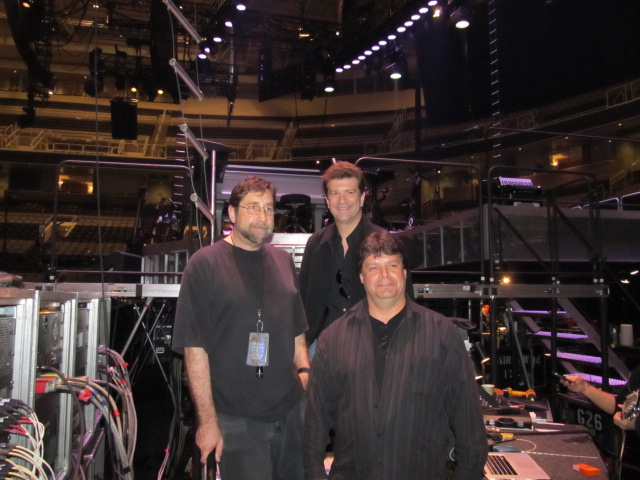
|
Backstage at the Bruce Springsteen Concert
Left to Right: Marty Gelhaar, David Rosenthal, Bill St. Amour
|
| |
Then there is a fourth station for percussionist Everett Bradley that is being used to play a lot of different samples, some effects and background snippets, and miscellaneous percussion. However, I want to stress that NOTHING at the show is pre-recorded or played from a track, everything is completely live and being played on stage. So everything on this RECEPTOR is living in Kontakt and being played live using a small controller keyboard.
And finally Max Weinberg has a RECEPTOR in his rig for triggering various drum sounds and samples, like kick drum samples, and that unit has a backup as well. These samples used to live in a K2600r, but I imported them into Kontakt to run on RECEPTOR. For that unit he is using Roland triggers and a Yamaha DTS70 trigger to MIDI converter... its an older piece of gear but it falls under the heading "if it ain't broke don't fix it". The system works great and is very reliable.
So in total there are 5 separate utilizations of RECEPTOR on the tour, with each station having a main unit and a backup.
Wow... you're obviously a big fan of virtual instruments, and of Kontakt 5 in particular. What do you think are the main advantages of using software instruments and samplers over the hardware instruments that the software replaces?
The latest generation of virtual instruments have become really, really powerful. You can have multiple instantiations running at the same time, all instantly accessible with the RECEPTOR Snapshot feature, so it just makes more sense to use software technology instead of the more limited hardware samplers or synths. And now with the maturation of sample streaming, which used to only be the realm of workstation software, you can now use RECEPTORS as live instruments without the traditional limits of RAM since you are constantly loading and playing at the same time. It really increases what you can do in a live performance, and no hardware sampler can touch that kind of performance.
You use RECEPTOR in a wide variety of roles - for piano, as a synth, as a drum module. How do you approach the use of RECEPTOR when designing a rig?
I look at RECEPTOR as a single music instrument capable of hosting whatever sound palette you need or choose to use. Inside you can have as many plug-ins as you need for the job, but the first step always involves determining what you need to accomplish musically.
Once you have determined the best way to go about getting what you need musically, then the 2nd step is to figure out how to configure each Receptor to do what you need. The musical needs determine what the programming will be.
You've now used RECEPTOR on a wide variety of different projects, and its clear you've been really successful using virtual instruments live. But why aren't more people using virtual instruments live? There are so many advantages to this technology... what would you say to someone that is on the fence about moving using virtual instruments, or checking out a RECEPTOR?
Well, people are rightfully concerned about these types of things because software instruments run on computers and computers crash! Everyone who as used a computer has experienced it crashing, so what you need to do is devote a computer entirely to the task of making music. You wouldn't use your synthesizer to check your email or make a phone call, it's a synthesizer and that's what you use it for.
Problems start because a computer needs to be optimized to only run the plug-ins, so that nothing conflicts with the task of making music. That's exactly what RECEPTOR is all about! Even though in essence it IS a computer, it functions as a dedicated musical instrument because it has an optimized Linux operating system that is focused solely on running virtual instruments.
So what are the primary advantages of choosing a RECEPTOR versus using an off-the-shelf computer?
The fact that RECEPTOR is dedicated is its advantage; its designed to function as a musical instrument and it does. That's the primary benefit; its not trying to be a word processor or email program, so you don't have the conflicts that a regular computer has in trying to run software instruments and streaming samples. The fact it is dedicated and optimized for that specific task makes it a very stable instrument.
Well, once you make the move to virtual instruments, you're faced with a huge number of options, which seems a blessing and a curse. There are thousands of really great virtual instruments out there... where do you start?
The first decision to be made is what kind of sounds you are looking for. Are they analog? Digital? Do you need to play a bunch of samples that were used on the record? All these decisions need to be made based on the musical genre you are performing and then it gets down to what you are comfortable with. I particularly like Kontakt, although I occasionally use ESX24. But since Kontakt runs great and comes pre-installed on RECEPTOR as part of KOMPLETE 8, and because it's a really powerful sampler that's pretty easy to use, it has become my go-to sampler these days.
What do you think of KOMPLETE 8? Its an amazing collection of sounds, isn't it?
I have KOMPLETE 8 installed on all the RECEPTORs I use! It has an incredibly powerful collection of instruments and effects, and offers a huge palette of sounds to choose from and it likely has most everything you might need. And even if it doesn't, there's Kontakt 5 in KOMPLETE 8 to bring in any custom sounds you might need to use. KOMPLETE 8 on RECEPTOR is a killer combination.
Obviously, RECEPTOR requires a MIDI keyboard to control it, and there are a wide variety of controllers and workstations out there. How do you choose which one is best for use with RECEPTOR?
It's a very important decision, but it's a matter of personal choice. In my rig I have a Motif ES7, a Kurzweil 2661, and a Fantom G6 - those are my three main controllers, and then I have Roland PK-5a bass pedals. I chose those controllers because I like the way they feel and the way they play. Roy Bittan uses a couple of Kurzweil PC2xs, because he likes the way they feel and they are great as well. Charley Giordano is using Motifs and Nords. So there's no right or wrong, it really comes down to what an individual player likes the feel of. It's my job as a programmer to tailor the sounds accordingly so they are optimized for the velocity response curves of whatever controllers are being used to control the RECEPTORs. It�s really important that everything not only sounds right but feels right too.
I understand that Roy has a real acoustic grand piano on stage, but there isn't a single microphone on it. Is there just a MIDI strip inside?
That's correct. It's a Yamaha C3 Grand with a Mark II MIDI system and controls Ivory II running on the RECEPTOR. It's a real piano, and gets tuned by Bill St Amour every night to keep it in good shape. Roy prefers a real piano action, and this feels like a real piano because it IS a real piano, and you can definitely feel the difference when playing. So Roy is able to play a real piano action, but what he and everyone hear in the audience is Ivory II from the RECEPTOR. This is actually a great way to go since it eliminates the downside of trying to mic a piano in a loud rock band setting. And since Ivory II is so expressive and so realistic sounding, and it runs so fast with low latency and such great stability on RECEPTOR, it's a great way to do a gig.
Do you think that hardware synths are on the way out? Will software virtual instruments ever completely replace hardware synthesizers?
Software is definitely the wave of the future. I don't know that hardware synths will ever go away completely. They may, but a lot of them have particular sounds that are very desirable that you can't quite get from a plug-in. Much like you have lots of different mics and preamps in a studio, such is true with synthesizers. Each brand has its own unique characteristics: Yamaha sounds different than Roland, which sounds different Kurzweil. So hardware synths are complimentary to what plug-ins offer, and of course they serve as controllers for the software synths as well.
So I think its unlikely that any one technology will dominate the whole music world, but plug-ins provide a great way for keyboard players to get what they want, which is a large palette of sounds that sound great and are really expressive. If you're always working with one brand keyboard, it's kind of like painting with one color and you end up with 25 shades of that color. Sure, with enough variations you can make a painting with one color, but its much better to have lots of different colors in your palette. Of course this is coming from someone who likes to have lots of different keyboards and sound sources to work with, but its not about wanting more gear, its about wanting more expressivity in sounds because each instrument has its own unique character and speaks differently.
So what advice would you have for someone looking to follow in your footsteps, and develop their programming chops? What do they really need to learn before they can become a proficient programmer?
I think the best thing to do is to learn HOW things work and WHY they do what they do. I was fortunate to learn about synthesis back when synths had patch cables, and if you didn't understand signal flow, like an oscillator feeding a filter, controlled by an envelope generator, then feeding an amplifier, if you didn�t understand how the whole chain worked then you didn't get any sound at all! You had to understand signal flow. But the same understanding is valuable today, since the same thing is happening inside plug-ins, except that it�s happening as algorithms inside a computer instead of through a maze of wires and modules. The concepts of signal flow remain important, and because I learned the fundamentals all those years ago, I'm able to apply it to new technologies as they come along. When I started learning my craft, computers didn't exist, MIDI didn't exist, and you couldn't even play a chord on a synth (since they were all monophonic), but the concepts of signal flow today are the same as they were back then.
So my advice to someone starting out is to learn what is happening inside the system, and understand why when you make a change something sounds better or worse. If you understand the fundamental concepts of synthesis, and why things happen as they do, then you'll always be able to apply that to whatever instruments come along in the future.
Do you have any particular recommendations on where people can go to learn this kind of thing?
Well, Berklee College of Music is a great school because they teach music and combine it with technology, and Full Sail is a great school as well. There are a lot of schools that will teach you music technology, but you need to go in knowing that you have to understand signal flow and the underlying concepts of how sound is created. These fundamental concepts apply to everything you do, whether you are recording engineer or end up programming synths. Any program that will teach you what is actually going on inside the technology, and not just how to use the gear, will be really beneficial for your career.
And you also need the musical knowledge; one hand washes the other. Music needs programming and programming needs music. They compliment each other, and a solid understanding of both will make you more adept at either of them.
What would you say to keyboardists who don't trust computers or software technology to replace their tried and true hardware instruments? And what advice do you have for someone who might be intimidated by the new technology?
I can understand how some players might be hesitant to make the leap to software instruments, especially if they put their toes in the water while the technology was still evolving and they had a bad experience with it. In the last few years the software technology has really come in to its own. Its reached a level where it sounds amazing, is truly playable, and its ability to contribute to your musical world is unmatched. And most importantly for live performance, it�s become much more stable.
I think the best advice I can give is to keep an open mind, and to try the new technology again. Technology for live performance, thanks to instruments like RECEPTOR, has progressed by leaps and bounds in the last few years not only in terms of power, but in terms of ease of use too. Software synthesizers can be used on stage and in performance because devices like RECEPTOR are streamlined and optimized so that it functions like a musical instrument. Its really done the trick for me in a wide range of situations from Broadway pits to concert stages in arenas. It's been great for me, and you should give it a try.
There are some musicians who think that a laptop is a good solution for playing music live, since they can do sequencing and recording at the hotel and run the virtual instruments on-stage at the gig. What do you think about trying to do everything on a laptop?
You should always have a laptop with you as all of those applications are important, but you should also have a RECEPTOR! Again, if you are serious about your music, you need a dedicated computer to run these software instruments. You need something that is optimized for running this kind of software, and that's exactly what RECEPTOR is all about. If you are looking for a single computer to manage your whole world, you are asking for trouble as things will conflict, and bad things can happen on stage. It's just the nature of the beast.
So what question did I fail to ask that you think needs answering? What parting advice would you give to people who are getting in to this exciting new technology?
People should always feel free to experiment and break the rules and create new sounds, but do it in rehearsals! You want to make sure your show is stable so when you do get on stage you can enjoy performing and not have to worry about your sounds!
David Rosenthal is an East-Coast-based keyboardist, programmer, arranger, and music systems consultant who works with top-name recording and touring acts. If you require professional system consulting or programming services, David can be reached at David@DavidRosenthal.com











